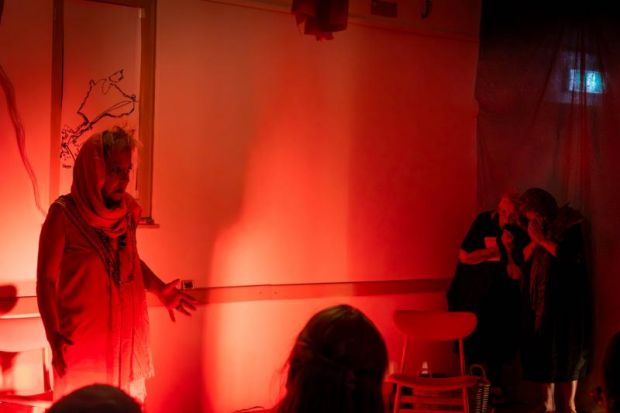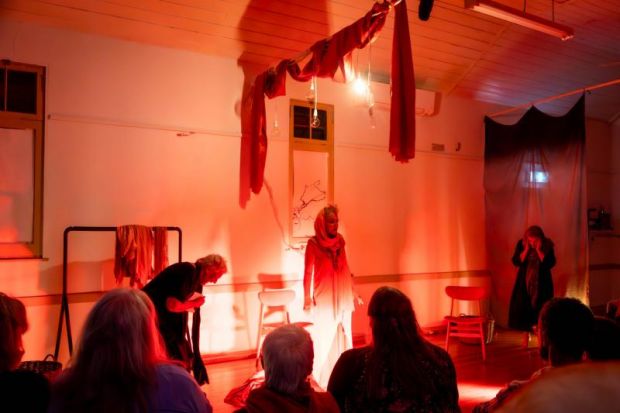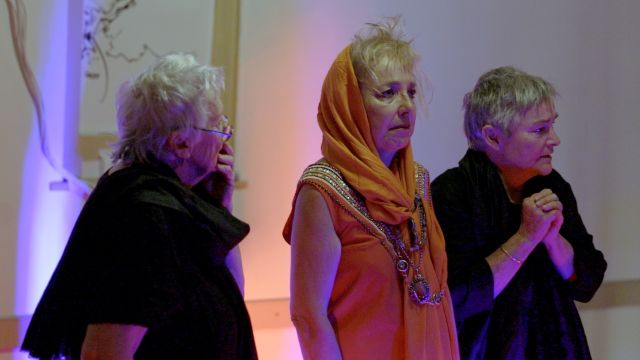Medea – An Exploration
A curious paradox: mix some inspired clowning with Euripides’ classic text and reveal even more ambiguities and ambivalences than you might have thought.
In a rather draughty and bare community hall, with minimal design, basic lighting, incidental props and costumes carried on in baskets, Beverly Geldard and Sue Ingleton are the Crones of the Acropolis – so they tell us, but in a way that suggests they don’t quite believe it themselves. Swathed in long robes, they’re simultaneously the Chorus (the Women of Corinth) and a couple of ill-prepared old girls about to put on a show. There’s some confusion and bickering and mucking around with the lighting. Geldard is the calm and patient authority figure and Ingleton is muddled – but in such a way that she endears herself to the audience. All this sets the tone. It’s funny and it brings this classic – and oft-performed – tragedy down to earth.
When Bridget Haylock appears as Medea, she’s in cliché madwoman mode, hair looking as if she’s stuck a finger in an electric socket... But once the Crones calm her down and control the hair and Medea begins to describe the cruelty, betrayal and injustices to which Jason has subjected her, the play suddenly lurches into dead serious as Haylock delivers Euripides’ text dead straight. But then Ingleton brings the rhetoric down by remarking to the audience – as if she’s just noticed: ‘It’s good, isn’t it?’

The cast’s ability to switch mode and tone on the instant is not just impressive; it’s very entertaining too. And those switches are at the heart of what this exploration is all about.
Later, Geldard, with the addition of a carboard crown and a different shawl, portrays both Creon and Aegeus very convincingly, with appropriate royal gravitas and authority. Ingleton dons a pinstripe scarf and cocky straw pork pie hat to play Jason as a self-satisfied spiv with a leer and much condescension. Somehow this portrayal of Jason (not a million miles from Euripides’) makes us picture new bride Glauce in such a way that we don’t feel a lot of sympathy when Medea murders her...
Medea’s fury, plotting, manipulating and wavering are given due weight. And while the Chorus might play it for laughs, they actually function as a real Chorus – that is, approving, then disapproving, egging Medea on, then withdrawing in horror from her actions – a true ebb and flow of sympathy and moral judgement. Medea isn’t just put-upon and crazy; she’s in a not-so-blind rage and she takes revenge as she can.

At the end, the drama and judgement hang in the air. Medea kills her two children and Glauce and Creon, of course, but we can understand how she was driven to it in the world in which she lived. The extra bit of agit-prop from Suzie Miller isn’t really necessary; this ‘exploration’ in its inventive, humorous, piss-taking way, has dramatised the issues very well indeed.
Michael Brindley
Subscribe to our E-Newsletter, buy our latest print edition or find a Performing Arts book at Book Nook.

